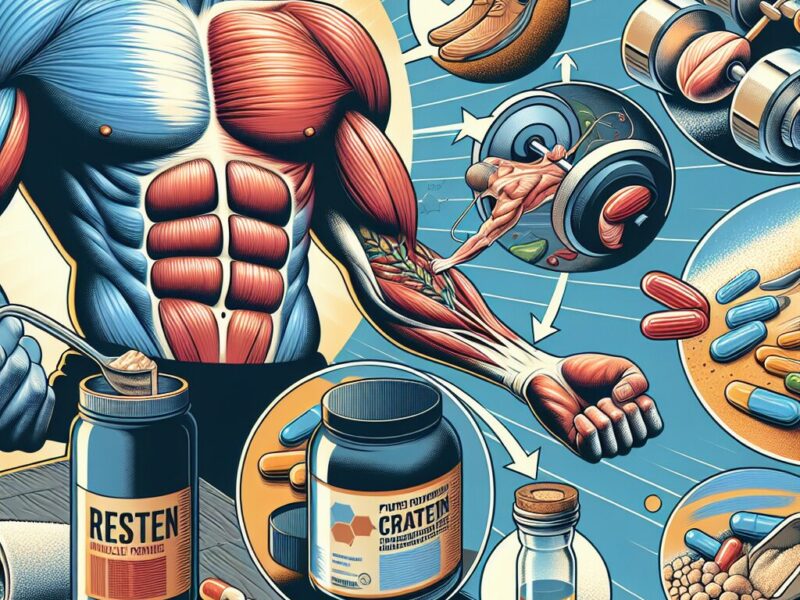Have you ever wondered how to achieve optimal health and wellbeing? Look no further than Complete Nutrition! This article explores the concept of complete nutrition and its importance in maintaining a balanced lifestyle. Discover the key elements of a well-rounded diet and learn how it can positively impact your overall health. Whether you’re aiming to lose weight, gain muscle, or simply improve your overall well-being, understanding the power of complete nutrition is crucial. So, let’s dive into the world of complete nutrition and unlock the secrets to a healthier you!
Definition of Complete Nutrition
Overview
Complete nutrition refers to a well-balanced diet that provides all the necessary nutrients and substances required by the body to function optimally. It is a holistic approach to eating that focuses on consuming foods that contain a wide range of macronutrients, micronutrients, water, fiber, essential fatty acids, antioxidants, and probiotics. These nutrients play crucial roles in various bodily functions, including growth and development, energy production, immune system support, and overall health maintenance. By prioritizing complete nutrition, you can ensure that your body receives all the essential elements it needs to thrive.
Components of Complete Nutrition
A complete nutrition plan encompass several key components, including macronutrients, micronutrients, water, fiber, essential fatty acids, antioxidants, and probiotics. Each of these components serves a distinct purpose and collectively contributes to overall health and well-being.
Importance of Complete Nutrition
Complete nutrition is vital for maintaining optimal health and well-being. By embracing a diet that provides all the necessary nutrients, your body can function at its best, supporting growth and development, boosting energy levels, strengthening the immune system, and warding off diseases and complications. Adequate nutrition also promotes healthy digestion, supports mental clarity and focus, helps maintain a healthy weight, and aids in the prevention of chronic diseases such as diabetes, heart disease, and certain cancers.
Macronutrients
Carbohydrates
Carbohydrates are the body’s primary energy source and should constitute a significant portion of your daily caloric intake. They are found in various forms such as grains, fruits, vegetables, and dairy products. Complex carbohydrates, like whole grains and legumes, provide sustained energy release, while simple carbohydrates, like sugars and refined grains, offer quick bursts of energy. It is important to choose complex carbohydrates over simple ones, as they are digested more slowly, preventing blood sugar spikes and crashes.
Proteins
Proteins are the building blocks of the body and are essential for growth, repair, and maintenance of tissues. They are found in animal products such as meat, poultry, fish, eggs, and dairy, as well as plant-based sources like legumes, nuts, and seeds. Complete proteins, which contain all the essential amino acids, are typically derived from animal sources. However, by combining different plant-based protein sources, such as beans and rice, you can also obtain a complete protein profile.
Fats
Contrary to popular belief, fats are an integral part of a healthy diet and play a crucial role in various bodily functions. They provide energy, support cell growth, protect organs, help absorb fat-soluble vitamins, and facilitate hormone production. Healthy fats, such as those found in avocados, nuts, seeds, and fatty fish like salmon, should be prioritized over unhealthy fats like trans fats and saturated fats, which can increase the risk of heart disease and other health issues.

Micronutrients
Vitamins
Vitamins are essential compounds that the body needs in small amounts to function properly. They play critical roles in processes such as cell growth, immune system functioning, energy production, and maintaining overall health. There are 13 essential vitamins, including vitamins A, B, C, D, E, and K. A balanced diet that includes a variety of fruits, vegetables, whole grains, lean meats, and dairy products can provide an adequate amount of vitamins. However, in some cases, supplements may be necessary, particularly if you have specific dietary restrictions or deficiencies.
Minerals
Minerals are inorganic substances that are vital for various bodily functions, such as bone health, nerve transmission, muscle function, and hormone regulation. There are two types of minerals: macrominerals, which are required in larger quantities, and trace minerals, which are needed in smaller amounts. Some important minerals include calcium, magnesium, potassium, iron, zinc, and iodine. Consuming a diverse range of foods, including leafy greens, dairy products, nuts, seeds, and lean meats, can help ensure adequate mineral intake.
Water
Importance of Hydration
Water is often overlooked, but it is undoubtedly one of the most critical components of complete nutrition. It plays numerous essential roles in the body, such as regulating body temperature, lubricating joints, transporting nutrients, flushing out toxins, and aiding in digestion. Staying properly hydrated is crucial for overall health and well-being.
Daily Water Intake
The amount of water you need to drink each day varies depending on several factors, including your age, sex, level of physical activity, and overall health. As a general guideline, it is recommended that adults consume at least eight 8-ounce glasses of water per day, which is equivalent to about 2 liters or half a gallon. However, it is important to listen to your body and drink more if you feel thirsty or if you engage in intense physical activity or live in a hot climate.

Fiber
Types of Fiber
Fiber is a type of carbohydrate that cannot be broken down by the body, but it plays a crucial role in maintaining a healthy digestive system and preventing various diseases. There are two main types of fiber: soluble and insoluble. Soluble fiber dissolves in water and forms a gel-like substance in the digestive tract, helping to regulate blood sugar levels and reduce cholesterol. Insoluble fiber, on the other hand, adds bulk to the stool, aiding in regular bowel movements and preventing constipation.
Health Benefits
Consuming an adequate amount of fiber has numerous health benefits. It helps maintain bowel regularity, prevents constipation, and promotes a healthy digestive system. Fiber also helps control blood sugar levels, lowers cholesterol levels, promotes satiety and weight management, and reduces the risk of developing chronic diseases such as heart disease, diabetes, and certain cancers.
Sources of Fiber
Fiber is found in a wide range of foods, particularly fruits, vegetables, whole grains, legumes, and nuts. By incorporating a variety of these foods into your diet, you can ensure that you are getting enough fiber. Some fiber-rich foods include apples, berries, broccoli, beans, lentils, oats, quinoa, and almonds. Aim to consume at least 25-30 grams of fiber per day for optimal health benefits.
Essential Omega-3 Fatty Acids
Importance of Omega-3 Fatty Acids
Omega-3 fatty acids are a type of polyunsaturated fat that the body cannot produce on its own. They play a vital role in brain function, heart health, inflammation reduction, and overall wellness. Including omega-3 fatty acids in your diet is crucial for maintaining good health and preventing chronic diseases.
Food Sources
Some of the best food sources of omega-3 fatty acids are fatty fish such as salmon, mackerel, sardines, and trout. Plant-based sources include flaxseeds, chia seeds, walnuts, and hemp seeds. Incorporating these foods into your diet can help ensure you are getting adequate amounts of omega-3 fatty acids.
Health Benefits
Omega-3 fatty acids have numerous health benefits. They are known to support heart health by reducing inflammation, improving cholesterol levels, and maintaining healthy blood pressure. Omega-3 fatty acids also play a vital role in brain health, as they are essential for cognitive function, memory, and mood regulation. They have been linked to a reduced risk of depression, anxiety, and age-related cognitive decline.

Antioxidants
Role of Antioxidants
Antioxidants are compounds that protect the body against the damaging effects of free radicals, which are unstable molecules that can cause oxidative stress and lead to various diseases and aging. Antioxidants help neutralize free radicals and prevent cellular damage, promoting overall health and well-being.
Rich Food Sources
A wide variety of foods contain antioxidants, including fruits, vegetables, nuts, seeds, and whole grains. Berries, such as blueberries, strawberries, and raspberries, are particularly rich in antioxidants. Other antioxidant-rich foods include dark leafy greens, tomatoes, bell peppers, nuts (especially walnuts), and dark chocolate.
Health Benefits
Consuming a diet rich in antioxidants has numerous health benefits. Antioxidants can help reduce the risk of chronic diseases, including heart disease, certain cancers, and neurodegenerative disorders. They also support a healthy immune system, slow down the aging process, promote glowing skin, and improve overall vitality.
Probiotics
Introduction to Probiotics
Probiotics are beneficial bacteria that help maintain a healthy balance of microorganisms in the gut. They support digestion, boost the immune system, enhance nutrient absorption, and promote overall gut health. Including probiotics in your diet is essential for maintaining optimal well-being.
Health Benefits
Probiotics offer a range of health benefits. They help improve digestion and alleviate symptoms of conditions like irritable bowel syndrome (IBS) and inflammatory bowel disease (IBD). Probiotics also support immune function, enhance nutrient absorption, and reduce the risk of allergies. Additionally, they promote mental health by influencing neurotransmitter production and reducing symptoms of depression and anxiety.
Sources of Probiotics
Probiotics are found in various fermented foods, including yogurt, kefir, sauerkraut, kimchi, miso, and tempeh. Taking a probiotic supplement can also be an effective way to ensure a healthy balance of beneficial bacteria in the gut.

Essential Nutrients for Different Stages of Life
Children
For children, complete nutrition is crucial for growth and development. They require a balanced diet that includes all the essential macronutrients and micronutrients. Calcium and vitamin D are particularly important for bone development, while iron supports cognitive function and overall growth. It is essential to offer a variety of fruits, vegetables, whole grains, lean proteins, and dairy products to meet their nutritional needs.
Teenagers
During teenage years, complete nutrition is essential to support rapid growth, hormonal changes, and overall development. Adequate protein intake is crucial for muscle and bone development. Calcium and vitamin D continue to be important for bone health, while iron helps prevent anemia. Encourage teenagers to make healthy food choices, prioritize nutrient-dense foods, and limit processed and fast foods.
Adults
As an adult, complete nutrition plays a vital role in maintaining overall health, preventing chronic diseases, and managing weight. A balanced diet that includes a variety of fruits, vegetables, whole grains, lean proteins, healthy fats, and adequate hydration is key. Consider individual needs, such as pregnancy, breastfeeding, or certain health conditions, and adjust nutrient intake accordingly.
Elderly Individuals
For older adults, complete nutrition becomes even more essential to support optimal health and prevent age-related issues. Adequate protein is crucial for maintaining muscle mass and preventing muscle wasting. Calcium and vitamin D continue to support bone health, while fiber aids digestion and prevents constipation. Paying attention to nutrient density, hydration, and potentially supplementing with vitamins and minerals becomes important as dietary needs change with age.
Nutritional Supplements
Types of Supplements
Nutritional supplements are products that contain one or more dietary ingredients, such as vitamins, minerals, herbs, amino acids, or enzymes. They are intended to supplement the diet and provide additional nutrients that may be lacking from food alone. Common types of supplements include multivitamins, omega-3 fish oil, vitamin D, and probiotics.
Benefits and Risks
Nutritional supplements can be beneficial for individuals who have specific nutrient deficiencies, dietary restrictions, or increased nutritional needs. They can help fill nutrient gaps and support overall health. However, it is important to remember that supplements should not replace a well-balanced diet. Excessive intake of certain nutrients can have adverse effects, and supplements may interact with medications. It is crucial to consult with a healthcare professional before starting any supplementation regimen.
Choosing the Right Supplement
Selecting the right supplement can be a daunting task due to the abundance of options available. It is important to choose supplements from reputable brands that undergo third-party testing to ensure quality and safety. Look for supplements that are certified by organizations such as the United States Pharmacopeia (USP) or ConsumerLab.com. Consider your specific needs, such as age, sex, health conditions, and consult with a healthcare professional who can guide you in choosing the appropriate supplements for your individual needs.
In conclusion, complete nutrition is vital for maintaining overall health and well-being. By ensuring a well-balanced diet that includes macronutrients, micronutrients, water, fiber, essential fatty acids, antioxidants, and probiotics, you can optimize your body’s function and reduce the risk of chronic diseases. Remember to prioritize nutrient-dense foods, choose a variety of sources, and consider individual needs at different stages of life. And if necessary, consult with a healthcare professional to determine the right nutritional supplements to support your unique requirements.





